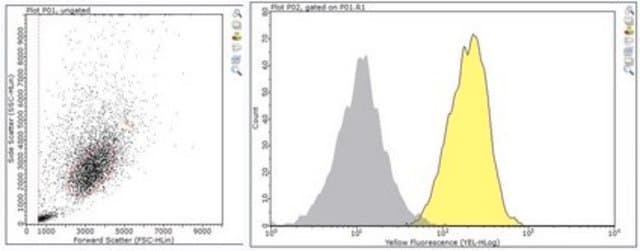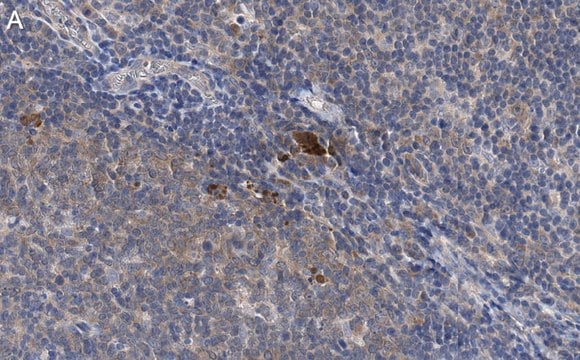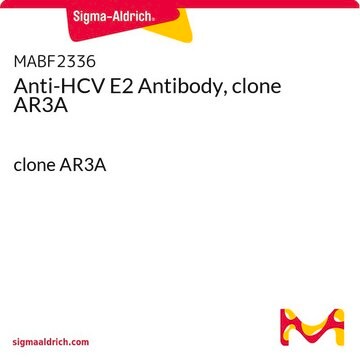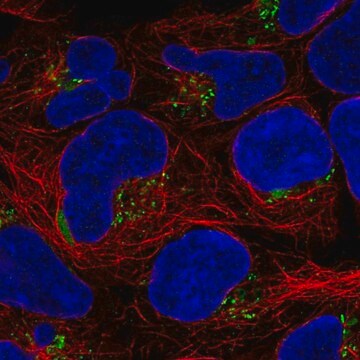MABF2034M
Anti-CD31/PECAM-1.2 Antibody, clone MBC 78.2
clone MBC 78.2, from mouse
Sinónimos:
Platelet endothelial cell adhesion molecule, PECAM-1, EndoCAM, GPIIA, PECA1, CD31
About This Item
Productos recomendados
biological source
mouse
Quality Level
antibody form
purified immunoglobulin
antibody product type
primary antibodies
clone
MBC 78.2, monoclonal
species reactivity
human
packaging
antibody small pack of 25 μg
technique(s)
ELISA: suitable
flow cytometry: suitable
immunocytochemistry: suitable
immunoprecipitation (IP): suitable
western blot: suitable
isotype
IgG1κ
NCBI accession no.
UniProt accession no.
target post-translational modification
unmodified
Gene Information
human ... PECAM1(5175)
General description
Specificity
Immunogen
Application
Agonist or Inhibitor Analysis: A representative lot was used in Agonist or Inhibitor applications (Newton-Nash, D.K., et. al. (1999). J Immunol. 163(2):682-8; Reedguist, K.A., et. al. (2000). J Cell Biol. 148(6):1151-8).
Flow Cytometry Analysis: 1 µg from a representative lot detected CD31/PECAM-1.2 in THP-1 cells.
ELISA Analysis: A representative lot detected CD31/PECAM-1.2 in ELISA applications (Mei, H., et. al. (2014). J Biol Chem. 289(30):20836-44).
Flow Cytometry Analysis: A representative lot detected CD31/PECAM-1.2 in Flow Cytometry applications (Newton-Nash, D.K., et. al. (1999). J Immunol. 163(2):682-8).
Immunoprecipitation Analysis: A representative lot detected CD31/PECAM-1.3 in Immunoprecipitation applications (Newman, D.K., et. al. (2016). Sci Signal. 9(418):ra27).
Western Blotting Analysis: A representative lot detected CD31/PECAM-1.3 in Western Blotting applications (Newman, D.K., et. al. (2016). Sci Signal. 9(418):ra27).
Inflammation & Immunology
Quality
Immunocytochemistry Analysis: A 1:500 dilution of this antibody detected CD31/PECAM-1.2 in THP-1 cells.
Target description
Physical form
Storage and Stability
Handling Recommendations: Upon receipt and prior to removing the cap, centrifuge the vial and gently mix the solution. Aliquot into microcentrifuge tubes and store at -20°C. Avoid repeated freeze/thaw cycles, which may damage IgG and affect product performance.
Other Notes
Disclaimer
¿No encuentra el producto adecuado?
Pruebe nuestro Herramienta de selección de productos.
Storage Class
12 - Non Combustible Liquids
wgk_germany
WGK 2
flash_point_f
Not applicable
flash_point_c
Not applicable
Certificados de análisis (COA)
Busque Certificados de análisis (COA) introduciendo el número de lote del producto. Los números de lote se encuentran en la etiqueta del producto después de las palabras «Lot» o «Batch»
¿Ya tiene este producto?
Encuentre la documentación para los productos que ha comprado recientemente en la Biblioteca de documentos.
Nuestro equipo de científicos tiene experiencia en todas las áreas de investigación: Ciencias de la vida, Ciencia de los materiales, Síntesis química, Cromatografía, Analítica y muchas otras.
Póngase en contacto con el Servicio técnico








